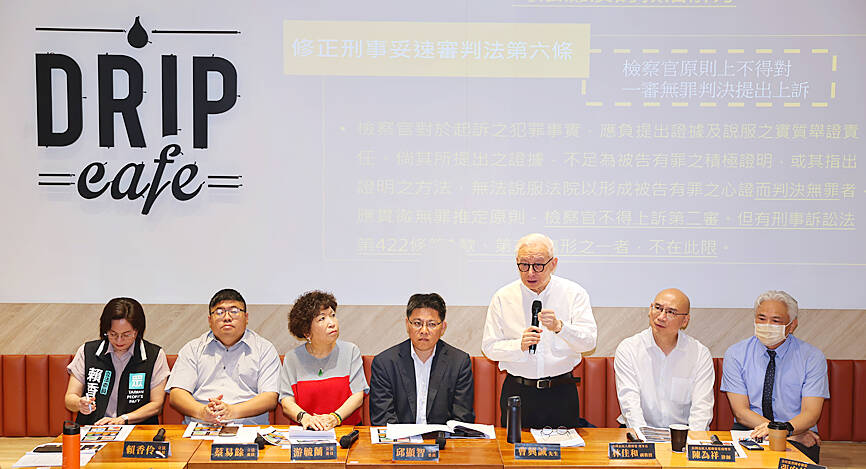United Microelectronics Corp founder Robert Tsao (曹興誠) yesterday called for “emergency bypass surgery” on the justice system by enhancing the role of police investigators to help prosecutors clear a backlog of cases.
Joined by legal experts and lawmakers at a news conference at the Legislative Yuan in Taipei, Tsao said that inefficiencies and outdated protocols had left the justice system in “paralysis.”
Comparing it to a coronary incident, he said it had clogged blood vessels and was headed for a heart attack.

Photo: CNA
“We must perform an emergency bypass surgery right now,” he said.
Police should be responsible for investigating petty crimes, before transferring them to prosecutors to “share the work burden and spur on cooperation,” while preventing the two sides from wasting time doing the same job, he said.
“It would also more reasonably and equitably divide our precious judicial resources, leading to improved efficiency for criminal investigations,” Tsao said.
In March, he launched the Taiwan Civil Liberties Union to advocate for judicial reforms, including expediting the legal process.
The intent of the Criminal Speedy Trial Act (刑事妥速審判法), which went into effect in 2019, is to prevent prosecutors from appealing a first ruling without good reason or sufficient new evidence, he said.
The current system allows prosecutors to file an appeal without due cause, which has resulted in delays and inefficiencies, leading to cases clogging up the courts, he said, adding that it also further harms the reputations of people who are later found not guilty in criminal matters.
“A justice system in paralysis cannot uphold justice for citizens,” Tsao said.
Taiwanese expect the Judicial Yuan and Executive Yuan to reform the legal system, “but the real battle is in the Legislative Yuan, for legislators to propose and approve amendments that improve the law and are in line with advances in society,” he said.
“In the past under one-party authoritarian rule, Taiwanese could only hope for a benevolent leader to grant them favors, to foster change. Now we are a democracy where the sovereignty and power are held by the citizens, so we should take up that responsibility to demand change, and unify our efforts to push for judicial reform,” he said.
Last year, prosecutors filed about 160,000 cases with charges that would carry minimum prison sentences of five years or less, Taiwan Jury Association director Chen Wei-shyang (陳為祥) said.
That made up about 65 percent of the total number of indicted suspects, many for petty crimes and not severe offenses, Chen said.
The police should have handled the investigating and evidence-gathering for these cases, he said.
“Public prosecutors had 750,000 cases last year, while we have fewer than 800 prosecutors. Each one has to address about 937 cases each year. They are overburdened and cannot do a thorough job for most cases,” he said.
Democratic Progressive Party Legislator Tsai Yi-yu (蔡易餘) said that civil groups and judicial reform advocates recommend that police investigators handle defamation, public insult, theft and other petty cases.
As police officers have close contact with local communities, they are more likely to fairly and reasonably investigate such matters, and then prosecutors can review the cases to determine whether to pursue indictments, Tsai said.

Alain Robert, known as the "French Spider-Man," praised Alex Honnold as exceptionally well-prepared after the US climber completed a free solo ascent of Taipei 101 yesterday. Robert said Honnold's ascent of the 508m-tall skyscraper in just more than one-and-a-half hours without using safety ropes or equipment was a remarkable achievement. "This is my life," he said in an interview conducted in French, adding that he liked the feeling of being "on the edge of danger." The 63-year-old Frenchman climbed Taipei 101 using ropes in December 2004, taking about four hours to reach the top. On a one-to-10 scale of difficulty, Robert said Taipei 101

Nipah virus infection is to be officially listed as a category 5 notifiable infectious disease in Taiwan in March, while clinical treatment guidelines are being formulated, the Centers for Disease Control (CDC) said yesterday. With Nipah infections being reported in other countries and considering its relatively high fatality rate, the centers on Jan. 16 announced that it would be listed as a notifiable infectious disease to bolster the nation’s systematic early warning system and increase public awareness, the CDC said. Bangladesh reported four fatal cases last year in separate districts, with three linked to raw date palm sap consumption, CDC Epidemic Intelligence

Two Taiwanese prosecutors were questioned by Chinese security personnel at their hotel during a trip to China’s Henan Province this month, the Mainland Affairs Council (MAC) said yesterday. The officers had personal information on the prosecutors, including “when they were assigned to their posts, their work locations and job titles,” MAC Deputy Minister and spokesman Liang Wen-chieh (梁文傑) said. On top of asking about their agencies and positions, the officers also questioned the prosecutors about the Cross-Strait Joint Crime-Fighting and Judicial Mutual Assistance Agreement, a pact that serves as the framework for Taiwan-China cooperation on combating crime and providing judicial assistance, Liang

US climber Alex Honnold left Taiwan this morning a day after completing a free-solo ascent of Taipei 101, a feat that drew cheers from onlookers and gained widespread international attention. Honnold yesterday scaled the 101-story skyscraper without a rope or safety harness. The climb — the highest urban free-solo ascent ever attempted — took just more than 90 minutes and was streamed live on Netflix. It was covered by major international news outlets including CNN, the New York Times, the Guardian and the Wall Street Journal. As Honnold prepared to leave Taiwan today, he attracted a crowd when he and his wife, Sanni,